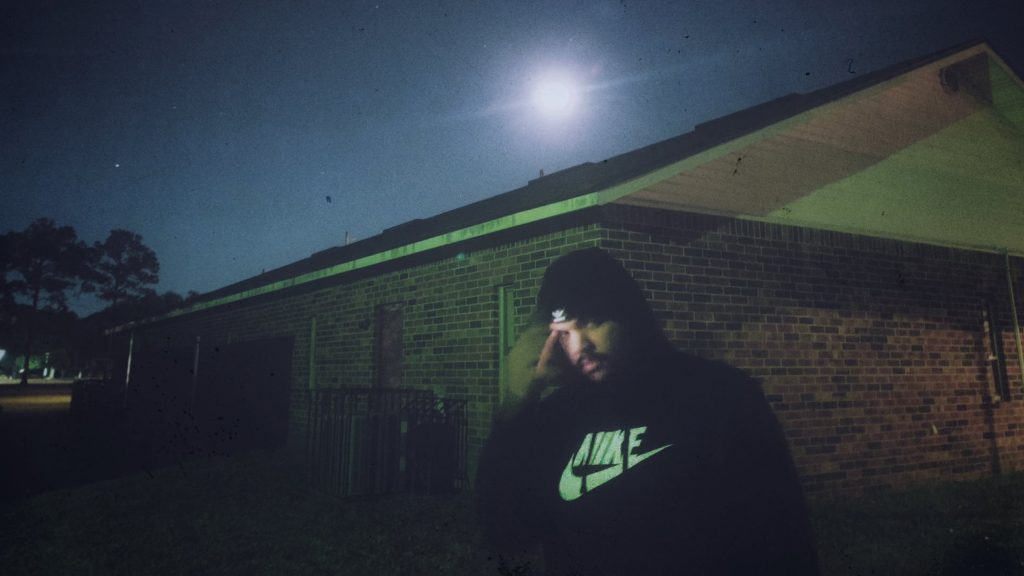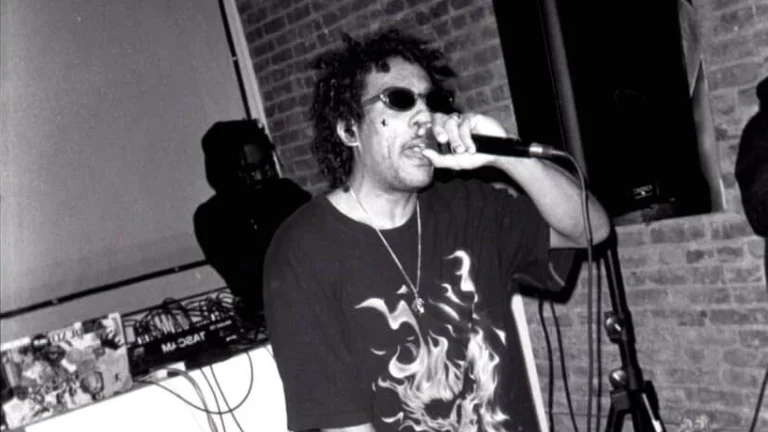Florida rapper Fuzhjin, with a dark gritty sound, socially conscious lyrics, and sage-like aura, has himself stated on social media: “Every piece of music I’ve released to this point has been a reflection of where I was at in life at that moment.” His latest 2024 release, “seven bless…,” is no different, serving as a miscellany of episodic manuscripts on his quest for social status and freedom of expression amidst the disorientation, hollowness, and alienation induced by his hard-pressed street hustle style. We’re left with a profoundly fiery album not so different from his previous releases, thematically and philosophically, functioning as a reexamination of his social and moral dissension in placing success above all else.
The album’s first track, “seven (intro),” kicks in with piano riff-like tones building in tempo with a slightly distorted voice in the background echoing “seven bless,” almost as eerily as a ghost in a haunted manor. It sets an atmospheric and reflective mood, featuring intricate sound layering. This gentle layering of sonic imagery produces something spine-chilling and, at the same time, oddly soothing as it loops its way to a climactic ending, the ominous echoes of “seven bless” fading out like a soundtrack in an M. Night Shyamalan movie. On this intro, it seems, that Fuzhjin’s goal is to build the appetite for his body of work and to declare the album as the titular character.
“beyond supreme.,” is the album’s second track, the first official ingress into Fuzhjin’s self-claimed bank of knowledge. The beat blends mellow, dreamy instrumentals, with cymbals softly clashing and 808s thumping, adding a unique “kick” to the mix. From a rhythmic hook, Fuzhjin flares into his signature spit-fire flow, in which I, if I attempted, would run out of breath three lines in. But it’s not just a fast and furious element; his melody has a pulsing cadence that engages the listener, too. As is often customary in rap music, the artist peppers the hook with humble (maybe rich) brags of girls who claim he’s got an “insane glow” and whatnot. He smears the gloss off the image as the rap begins, introducing a monologue of his inner mind: “Hey, how y’all feeling? Me, stuck in the mood.” He goes further to sketch these demons, from the anguish of losing love to a larger self-conflicting dilemma, which he describes in paradoxes: “A lover, a fighter / A free-spirit fueled by a selfish desire / Who wanna get big but still wanna inspire / Who wonder if one day he can just get any higher.” Lines that thereby reveal a nagging wish for stardom against bourgeoisie egoism for artistic integrity over fame. Perhaps he feels the supreme need to be true to his art as it would be an injustice to his divine gifts to do otherwise, disparaging the knowledge that he’s come to make the major appeal of his style.
On “late nights.,” Fuzhjin wastes no time on prefaces before continuing down the path he paved on the previous track, deepening into a philosophical deliberation of his morality and ego. “To keep my heart is incumbent / Mysterious ways played / I went from someone to suffering / like it was nothing,” he says, right before his ego takes over, registering righteous indignation. In this Jekyll-and-Hyde duplicity, it’s often hard to distinguish truth from ego—or why the artist chooses to wear multiple faces, flowing in and out of liminal spaces of openness. In one line, he confesses, “To my vices and anxiety, I’m becoming a slave,” and another: “Money, hustling, music / Tell me what I need relief for? / Realized they non-existent became my personal hero.” Is it peculiar to “late nights.” his lyrics often feel like segments on an identity crisis maze, in which listeners are tasked with unearthing the connection, or is this dissonance a throbbing theme of the album?
“benihana.,” where the album reaches a high note, begs to differ. Notably commencing with the chug-like accent of trains integrated with other ambient sounds, there’s a subtle tone change from the lush, laid-back tempo to a curiously apprehensive one. But when the beat kicks in, with all the trappings of a Metro Boomin-produced track, awe takes over, sending dopamine receptors into overdrive. The high-powered track opens using an Instagram caption-worthy liner with serious mantra potential for a new generation of workaholics: “Lots on my plate, can’t complain I want food, nigga.” Aside from being a hustler’s anthem, with the morale of a gorilla and rapid ferocity of a machine gun, the rapper, on this song, clears any ambiguity and vulnerability he may have let slip on previous tracks. The song’s boldness is either a wishful expression—a brick wall full of cracks—or an honest conviction. It’s a slippery slope.
The backstory to this clear line of conviction then manifests itself in “lost knowledge.,” a raging confessional of the rapper once again addressing his demons, and “trauma of yesteryear”—this time with nuance and clear-cut honesty that redeems him from a path of denial, which otherwise makes a hypocritical stain on his body of work. He reintroduces the theme of failed love as a catalyst for the painful experiences that go on to hound his existence, candidly observing his self-dichotomy. “…I can’t help but think about lying inside the wave crest,” he says. By presenting his flaws, the dots begin to connect, and we’re presented with an artist emerging from the rubble of what seemed like shattered perceptions of individualism to one who’s not split but as naturally multifaceted as anyone steeped in intellectualism. By the end of the track, his voice is chock-full of emotions competing with the air in his lungs—the kind of verity that makes one worth paying attention to.
On the following track, “god save me.,” a dulcet composition of synths rises and softens out into the riveting background as he begins to sing, elaborating on his troubled relationship and the part he plays in his grief. “Every time we makeup, we regret ‘cause I ain’t got time / Some promises always get broke / leaving ‘cause you can’t stand my lies.” Not for lack of trying, he quantifies his issues as too “sublime” to deal with on his own, hoping “god saves him.” With “god save me.,” an open vulnerability peels another layer of complexity off his brazen persona, revealing his proclivity to the grind juxtaposed by the downsides of a laser-focus ambition; the toll it takes on every facet of life. It’s like he’s caged in his mind, desperate to get out but too institutionalized to escape it. The rhythm changes with 808s kicking in alongside the tinkling synths, adding a dramatic effect, as he delves into an even more thoughtful segment, exploring the anger, pain, and hate he grapples with: “It’s too much pain I’m feeling… / I’ve been drinking heavy.” Later, he admits his tendency to dissociate—the dissonance noted earlier in the album. It is a no-holds-barred, in-depth introspection that requires boldness and grit.
The last track, “bless…(outro),” begins in the same vein as the intro but takes a more upbeat stride whereas the former was haunting, a concerto of percussive instruments on an overlay of a horn-driven, grooving beat. Fuzhjin looks back on his life and cannot downplay the irrefutable fact that he needs help. Still, pride trumps good intentions: “Go get some help but I won’t.” Fuzhjin brings acute miserablism to rap in that he would rather sing about feeling lost than find a way out, resorting to hyper-workaholism in place of therapy: “My solution is go get the bread.” It’s a cliché narrative, but Fuzhjin makes it clear how much he’s willing to sacrifice for his dream—not excluding love and family—and it’s an impressive albeit frightening cut-throat determination.
In seven bless… Fuzhjin has a delicious flow, and the album is a sonic feast, even as he touches on dark matter. There is something nearly transcendent about the artist’s determination to stay afloat in life’s storms connecting him to a larger-than-self purpose, even though he is, ironically, selfish in his desires. While Fuzhjin grapples with the weight of his choices and the complexities of his identity, he ultimately emerges as a relatable figure, navigating the fine line between aspiration and the toll it takes on his life. This album is not just a collection of songs; it’s a candid exploration of the human experience, resonating with anyone who has faced the shadows of their ambitions.





